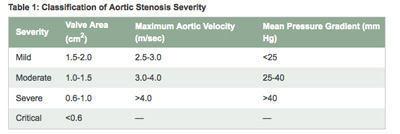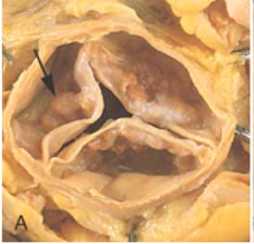“How Quickly Does Heart Valve Stenosis Progress?” Asks Emma
By Adam Pick on April 27, 2010
Emma just emailed me an interesting question about aortic valve stenosis and the rate at which this form of heart valve disease progresses.

She writes, “Hi Adam – I’ve recently been diagnosed with moderate aortic stenosis even though I have no symptoms. My latest echocardiogram shows a valve area of 1.2 square centimeters. For now, my cardiologist says we’re in ‘Monitor Mode’ with the chance of surgery in the future. Do you know of any clinical studies that document the rate at which aortic stenosis progresses? I’d like to know how many years before I may need heart valve surgery. Thanks, Emma”
Emma raises an interesting question. As you can see in the diagnostic chart below, Emma’s aortic valve is not narrow enough to position her in the severe or critical category. That said, I imagine her cardiologist will require routine echocardiograms every 6 to 12 months to further evaluate valve function and the potential onset of symptoms.

(Source: The Cleveland Clinic)
As for Emma’s question about the rate at which aortic stenosis progress, I have done some research on the topic. Thus far, I have not found much data which establishes a definitive benchmark for aortic valve narrowing over time. To some extent, this makes sense as each patient is unique with his or her own physical factors which impact valvular deterioration.
However, I did come across an interesting piece of research that details the rate of aortic stenosis with patients experiencing calcified aortic valve leaflets. According to The Cleveland Clinic, aortic stenosis tends to progress more rapidly in patients with degenerative calcific aortic valve disease than in those with congenital or rheumatic disease.

Calcified Aortic Valve
According to The Cleveland Clinic, catheterization and echocardiographic studies suggest that, on average, the valve area declines 0.1-0.3 square centimeters per year. The Cleveland Clinic also states that the systolic pressure gradient across the aortic valve can increase by as much as 10-15 mm Hg per year. Finally, a more rapid rate of aortic stenosis progression is observed in elderly patients with coronary artery disease (CAD) and chronic renal insufficiency.
Although there is no definitive rate of aortic stenosis progression across the entire patient community, I hope this information offers some insight into this topic. So you know, I suffered from aortic stenosis due to a bicuspid valve with calcified leaflets. Over an eight-year period, my valve deteriorated from a mild diagnosis to a severe diagnosis at which time my aortic valve was replaced via the Ross Procedure.
If you are a former patient, perhaps you can share your experience with Emma? Scroll down to leave a comment or read 40+ patient responses to this post.
Keep on tickin!
Adam











